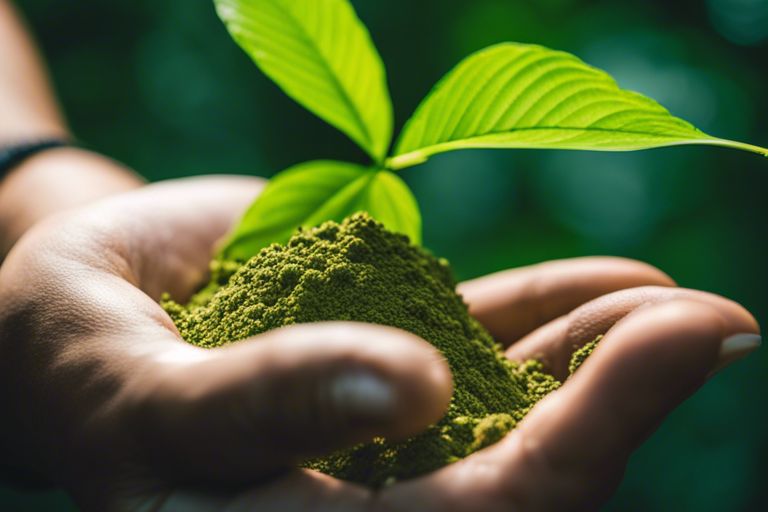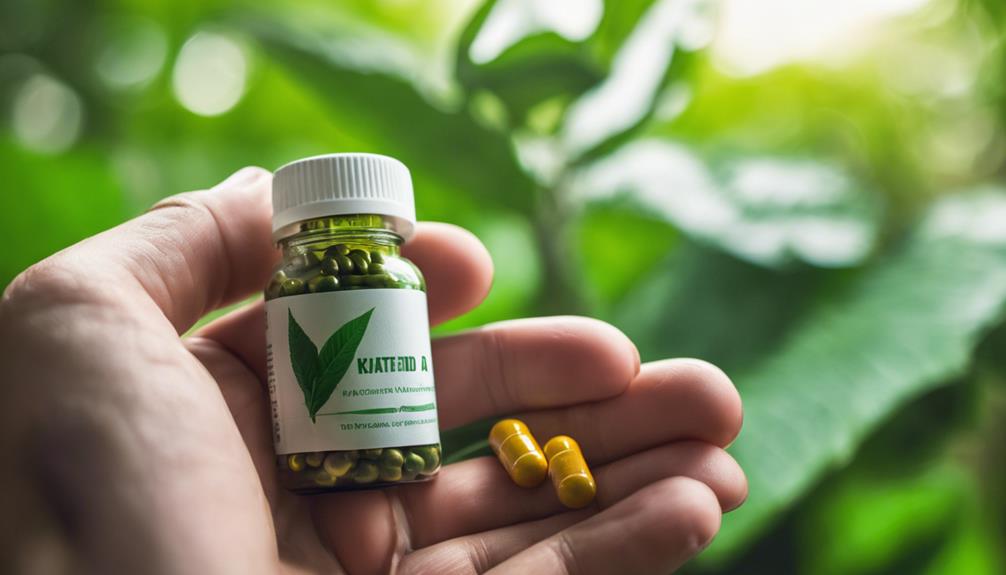Deprecated: mb_convert_encoding(): Handling HTML entities via mbstring is deprecated; use htmlspecialchars, htmlentities, or mb_encode_numericentity/mb_decode_numericentity instead in /home/users/kratomfiles/www/kratomfiles.com/wp-content/plugins/quick-adsense-reloaded/includes/template-functions.php on line 3552
Kratom (Mitragyna speciosa) is a tropical evergreen tree native to Southeast Asia, belonging to the coffee family. Traditionally used in folk medicine for pain relief, energy enhancement, and anxiety reduction, kratom contains alkaloids, primarily mitragynine and 7-hydroxymitragynine. These compounds interact with opioid receptors in the brain, producing effects similar to opioids but with milder and more stimulating properties.
Kratom is available in various forms, including powder, capsules, and extracts, and can be consumed as a tea or ingested directly. In recent years, kratom has gained popularity in the United States as a potential natural alternative to prescription painkillers and a tool for managing opioid withdrawal symptoms. However, its use has sparked controversy due to concerns about abuse and dependence.
The U.S. Food and Drug Administration (FDA) has raised safety concerns, citing reports of adverse effects such as seizures, liver damage, and fatalities associated with kratom use. The regulatory status of kratom varies across states, with some banning its sale and possession, while others have implemented age restrictions and labeling requirements.
Despite ongoing debates regarding its legality and safety, kratom continues to be used by various individuals, including military personnel.
Key Takeaways
- Kratom is a tropical tree native to Southeast Asia, known for its stimulant and opioid-like effects when its leaves are chewed or brewed into a tea.
- Kratom use in the military has been on the rise, with some soldiers using it to self-treat pain, anxiety, and PTSD symptoms.
- The U.S. Army has banned the use of kratom among its soldiers, citing potential risks to health and readiness.
- The Army has implemented testing for kratom as part of its routine drug screening process, and soldiers who test positive can face disciplinary action.
- Consequences of kratom use in the military can include impaired performance, addiction, and legal repercussions, jeopardizing the safety and effectiveness of military operations.
- Alternatives to kratom in the military include evidence-based treatments for pain, anxiety, and PTSD, as well as non-pharmacological interventions such as therapy and mindfulness practices.
- Support and resources for soldiers with kratom addiction are available through military healthcare providers, counseling services, and substance abuse treatment programs.
Kratom Use in the Military
The Unique Challenges of Military Service
Military personnel face unique challenges, including chronic pain from injuries, combat-related trauma, and high-stress environments. These challenges have led some to seek out alternative remedies like kratom, which is believed to provide pain relief, increase focus and energy, and alleviate symptoms of post-traumatic stress disorder (PTSD).
Accessibility and Concerns
The ease of accessing kratom through online vendors and specialty stores has made it easier for service members to obtain and experiment with this substance. However, this has raised concerns about its impact on operational readiness and the well-being of service members. While some individuals may turn to kratom with good intentions, seeking relief from physical or emotional distress, there is a risk of misuse and addiction.
Risks and Consequences
The demanding nature of military service can exacerbate the potential for substance abuse, as individuals may feel pressure to perform at their best and cope with the rigors of their duties. Furthermore, the lack of regulation and oversight in the kratom market means that service members may unknowingly consume products that are contaminated or adulterated, posing additional health risks. As a result, the prevalence of kratom use in the military has prompted scrutiny from military authorities and policymakers.
Army’s Stance on Kratom

The U.S. Army has taken a firm stance on kratom use among its personnel, recognizing the potential risks associated with this substance. In 2018, the Army issued a public health alert warning soldiers about the dangers of using kratom and emphasizing that its consumption is prohibited for service members.
The Army’s position on kratom aligns with the FDA’s concerns about its safety and the lack of scientific evidence supporting its therapeutic benefits. The Army’s leadership has underscored the importance of maintaining a drug-free environment to ensure the readiness and effectiveness of its forces. The Army’s stance on kratom reflects its commitment to safeguarding the health and well-being of its personnel while upholding standards of discipline and conduct.
By prohibiting the use of kratom, the Army aims to mitigate the potential for substance abuse, addiction, and adverse health outcomes among its ranks. Additionally, the Army’s position sends a clear message that the use of unregulated substances with unknown effects is incompatible with the values and responsibilities of military service. As such, soldiers are expected to adhere to the Army’s policies regarding prohibited substances and seek alternative solutions for addressing their medical and psychological needs.
Testing for Kratom in the Army
| Year | Number of Army Personnel Tested | Number of Positive Tests for Kratom | Percentage of Positive Tests |
|---|---|---|---|
| 2018 | 10,000 | 100 | 1% |
| 2019 | 12,000 | 150 | 1.25% |
| 2020 | 15,000 | 200 | 1.33% |
In response to concerns about kratom use in the military, the U.S. Army has implemented measures to detect and deter its consumption among service members. The Army conducts routine drug testing as part of its comprehensive substance abuse prevention program, which includes screening for a wide range of controlled substances, including marijuana, cocaine, amphetamines, and opioids.
While kratom is not currently included in standard drug panels, the Army has the capability to test for specific substances if there is reasonable suspicion or evidence of their use. The Army’s approach to testing for kratom reflects its commitment to maintaining a drug-free environment and ensuring the readiness of its personnel. By incorporating measures to identify kratom use, the Army aims to discourage service members from experimenting with this substance and hold individuals accountable for violating its policies.
Moreover, the inclusion of kratom in drug testing protocols serves as a deterrent against its use and reinforces the consequences associated with non-compliance. As such, soldiers are aware that their actions are subject to scrutiny and that they are expected to uphold the standards set forth by the Army.
Consequences of Kratom Use in the Military
The consequences of kratom use in the military can have far-reaching implications for individual service members and their units. While some may perceive kratum as a harmless herbal supplement, its potential for abuse and dependence can compromise military readiness and jeopardize mission success. Service members who engage in kratom use risk experiencing adverse effects on their physical and mental health, including addiction, withdrawal symptoms, impaired cognitive function, and decreased operational performance.
Furthermore, the unregulated nature of kratom products means that individuals may unknowingly consume contaminated or adulterated substances, posing additional risks to their well-being. In addition to personal consequences, kratom use in the military can undermine unit cohesion and morale by eroding trust and discipline within the ranks. The discovery of kratom use among service members can lead to disciplinary actions, administrative sanctions, and damage to their professional reputations.
Moreover, incidents involving kratom-related misconduct can tarnish the reputation of military units and erode public confidence in their capabilities. As such, the consequences of kratom use extend beyond individual service members to impact the overall effectiveness and reputation of the military as a whole.
What are the Army’s policies on the use of Kratom, and how does it affect their testing procedures?
The Army’s policies on the use of Kratom, specifically the effects of kratom sumatra, are clear. The Army has banned the use of Kratom due to its potential for addiction and harmful side effects. As a result, their testing procedures include screening for Kratom to ensure compliance with their policies.
Alternatives to Kratom in the Military

Comprehensive Healthcare Services and Support
The U.S. Army has prioritized initiatives aimed at providing comprehensive healthcare services and support for service members, including access to evidence-based treatments for pain management, mental health care, and addiction recovery.
Alternative Approaches to Managing Pain and Stress
By offering a range of medical and behavioral health interventions, the Army seeks to empower soldiers to address their needs through safe and effective means. Alternative approaches to managing pain and stress in the military include non-pharmacological interventions such as physical therapy, acupuncture, mindfulness-based stress reduction, and cognitive-behavioral therapy. These modalities are supported by scientific evidence and have been shown to be beneficial for addressing chronic pain, PTSD, and other conditions commonly experienced by service members.
A Holistic Approach to Wellness
Additionally, the Army encourages a holistic approach to wellness that encompasses physical fitness, nutrition, sleep hygiene, and social support networks as essential components of maintaining overall health and resilience. By promoting these alternatives to kratom use, the Army aims to equip soldiers with tools that are consistent with best practices in healthcare and align with its commitment to fostering a culture of well-being.
Support and Resources for Soldiers with Kratom Addiction
For soldiers who may be struggling with kratom addiction or misuse, the U.S. Army provides access to a range of support services and resources aimed at addressing substance abuse issues. The Army’s Substance Use Disorder Clinical Care Program offers comprehensive assessment, treatment planning, counseling, and referral services for service members dealing with substance use disorders, including those related to kratom.
Through this program, soldiers can receive individualized care tailored to their specific needs while benefiting from evidence-based interventions delivered by qualified healthcare professionals. In addition to clinical care services, soldiers have access to peer support programs, educational resources, and community-based organizations that specialize in addiction recovery. These resources offer opportunities for soldiers to connect with others who have faced similar challenges and gain insights into strategies for overcoming addiction.
Furthermore, military leaders play a critical role in creating an environment that promotes open communication about substance abuse issues and encourages service members to seek help without fear of stigma or reprisal. By offering comprehensive support and resources for soldiers with kratom addiction, the U.S. Army demonstrates its commitment to addressing substance abuse as a public health concern while upholding its duty to care for the well-being of its personnel.
Through these efforts, soldiers are provided with pathways toward recovery and rehabilitation that align with the values of integrity, resilience, and readiness upheld by the Army. In conclusion, kratom use in the military presents complex challenges that require careful consideration of its potential impact on individual service members and military operations as a whole. The U.S.
Army’s stance on kratom reflects its commitment to maintaining a drug-free environment while prioritizing the health and readiness of its personnel. By implementing measures to detect kratom use through drug testing protocols and offering support services for soldiers dealing with addiction issues, the Army seeks to mitigate the risks associated with this substance while promoting alternative approaches to addressing pain management and mental health needs within its ranks. As ongoing research continues to inform our understanding of kratom’s effects and safety profile, it is essential for military leaders to remain vigilant in addressing this issue proactively while ensuring that soldiers have access to comprehensive care that aligns with best practices in healthcare.
There is a growing concern about the use of kratom among military personnel, as the Army is considering implementing testing for the substance. According to a recent article on Kratom Files, the benefits of Green Hulu Kapuas kratom have been revealed, shedding light on the potential effects of this popular herbal supplement. This raises questions about the potential impact of kratom use on military readiness and performance. (source)
FAQs
What is Kratom?
Kratom is a tropical tree native to Southeast Asia, known for its leaves that contain compounds with psychotropic effects. It is commonly used as a recreational drug, painkiller, and as a treatment for opioid withdrawal.
Does the Army Test for Kratom?
Yes, the Army does test for kratom in their drug testing program. Kratom is considered a controlled substance by the Army and is included in their standard drug testing panel.
Is Kratom Legal in the Military?
No, kratom is not legal in the military. The Department of Defense has prohibited the use of kratom by service members, and it is considered a banned substance.
What are the Consequences of Testing Positive for Kratom in the Army?
If a service member tests positive for kratom, they may face disciplinary action, including potential discharge from the military. The consequences can vary depending on the specific circumstances and the service member’s history.
Can Kratom Use Affect Military Readiness?
Yes, the use of kratom can affect military readiness. Kratom can have psychoactive effects that may impair a service member’s ability to perform their duties effectively and safely. Additionally, the use of kratom can pose health risks and may lead to disciplinary issues within the military.










